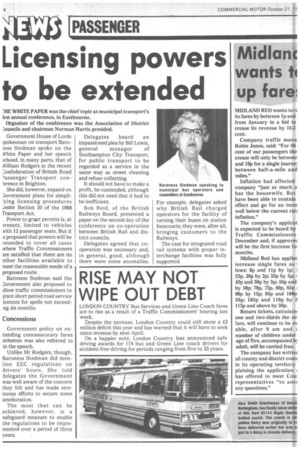Licensing powers to be extended
Page 28

If you've noticed an error in this article please click here to report it so we can fix it.
HE WHITE PAPER was the chief topic at municipal transport's irst annual conference, in Eastbourne.
Organiser of the conference was the Association of District ouncils and chairman Norman Harris presided.
Government House of Lords ;pokesman on transport Baroless Stedman spoke on the White Paper and her speech ;choed, in many parts, that of William Rodgers at the recent :onfederation of British Road )assenger Transport conerence in Brighton.
She did, however, expand on overnment plans for simpli'ying licensing procedures ander Section 30 of the 1968 Transport Act.
Power to graint permits is, at )resent, limited to vehicles with 12 passenger seats. But it s proposed that powers will be xtended to cover all cases where Traffic Commissioners are satisfied that there are no Dther facilities available to meet the reasonable needs of a proposed route.
Baroness Stedman said the 30vernment also proposed to allow traffic commissioners to ;rant short period road service icences for spells not exceedng six months.
Concessions
Government policy on extending concessionary fares schemes was also referred to in the speech.
Unlike Mr Rodgers, though, Baroness Stedman did mention EEC regulations on drivers' hours. She told delegates the Government was well aware of the concern they felt and has made strenuous efforts to secure some amelioration.
The most that can be achieved, however, is a safeguard measure to enable the regulations to be implemented over a period of three years. Delegates heard an impassioned plea by Bill Lewis, general manager of Southampton City Transport, for public transport to be regarded as a service in the same way as street cleaning and refuse collecting.
It should not have to make a profit, he contended, although this did not need that it had to be inefficient.
Bob Reid, of the British Railways Board, presented a paper on the second day of the conference on co-operation between British Rail and district councils.
Delegates agreed that cooperation was necessary and, in general, good, although there were some anomalies. For example, delegates asked why British Rail charged operators for the facility of turning their buses on station forecourts; they were, after all, bringing customers to the Railways.
The case for integrated road rail systems with proper interchange facilities was fully supported.






































































































